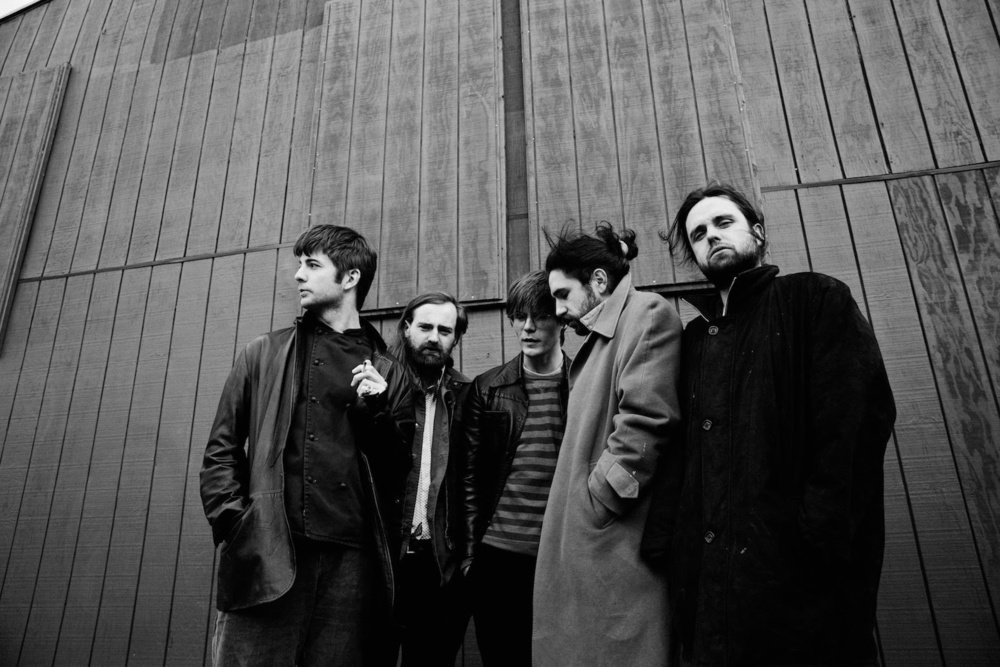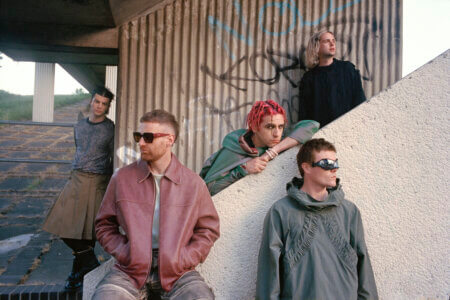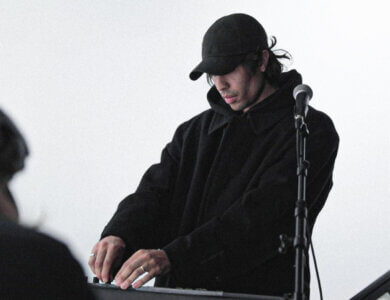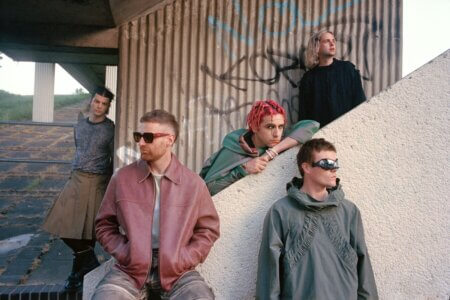Fontaines D.C. Aren’t Afraid of Disappointing

“We wrote an album that we’re really happy with, and we’re very aware that in some cases, people might not be happy with the way our music has developed. But this is an album that we fully stand behind.” Fontaines D.C. guitarist Conor Curley is talking to Northern Transmissions by phone from Ireland about their upcoming album, A Hero’s Death. The Dan Carey-produced album is due July 31 via Partisan Records and follows the Dublin quintet’s 2019 debut, Dogrel.
Fontaines D.C. have gained particular praise for their lyrics, which paint vivid scenes of their home city. That won’t change with the impressionistic poetry of A Hero’s Death, even though they’re less specific to a place. But the songs on A Hero’s Death are more complex in arrangement than those of its walloping predecessor. They’re also more ruminative. Whereas Dogrel warranted Fontaines D.C. tours with similar post-punk contemporaries like IDLES and Shame, A Hero’s Death takes cues from the dour likes of the Pixies, Suicide, Leonard Cohen, Lee Hazelwood, Rowland S. Howard, and the Birthday Party.
The album title and cover art wink at the potential blowback; the band could very well end up the hero in “A Hero’s Death.” The cover features an image of The Dying Cúchulainn by sculptor Oliver Sheppard. The statue commemorates the 1916 Easter Rising, an insurrection of Irish nationalists in Dublin against British rule. The rebellion ended in 485 deaths, including the execution of the rebellion leaders. “Cúchulainn is one of the biggest heroes in Irish mythology,” Curley explains of the demigod.
Never ones to mind reviews, Fontaines D.C. are also able to shake off expectations because they’re wary of getting caught up in the hustle. Even before they found international success, on Dogrel opener “Big,” singer Grian Chatten compared ambition to a sickness born of capitalism. The sentiment continues on A Hero’s Death track “Televised Mind.” “Now you don’t care what they say, and neither do I,” Chatten sings. It’s no surprise Fontaines D.C. aren’t afraid of disappointing their fans.
It’d have been easy for Fontaines D.C. to get swept up in their own hype. Dogrel earned rave reviews, and the band developed a reputation for whirlwind live shows. Yet they’ve maintained a healthy grasp on their success, thanks in part to their good sense of self. “I think that’s just how we’ve always been,” Curley says. “I don’t know if it’s an Irish defense thing to laugh at yourself, but even with Dogrel, “dogrel” means a piece of throwaway poetry.” It also helps that the Irish don’t suffer egos. “I think the way we are is definitely down to us as a group, people in Dublin, and also the group around us, having people who are level-headed who keep us in line. If we’re ever caught walking into the bar wearing sunglasses inside and all that kind of stuff, we’re immediately pretty grounded. I think that’s something that would definitely carry on, true whatever we do.”
But having the confidence to do things their way doesn’t mean the band have been free of stress. Chatten had described the experience of writing A Hero’s Death as “always manic,” one that swung from self-destruction to “pure hollow euphoria.” Curley attributes the swings to the band’s hectic schedule. “Say if we got back to Dublin on a Monday, we’d have Tuesday, Wednesday, and then we’d be off again, so it felt really cathartic to go in [to the studio] and write songs that are hard and loud and experimental after having to churn out the same live set during the weekend four nights in a row. So there was this bit of euphoria in the way that we were creating, but also with the timeline we were on, it was hard. It was physically hard to do.” But the urgency paid off. “I think the atmosphere and the environment we created around it really enhanced the songs that came out of the sessions.”
One song Curley is particularly proud of is “You Said.” Co-written with Carlos O’Connell, the band’s other guitarist, it couldn’t have come together more easily. “Whenever I came into the rehearsal room, we all knew the riff, and we played the song the way it ended up. That song was an incredible feeling because sometimes you have to work on arrangements, and sometimes you have to really figure them out. To have that one time whenever it just works was just complete communication between us. I have fond memories of that.” The title-track from A Hero’s Death offers clues about how the band has kept level heads throughout their rise. The song plays like a mantra for how to be a good person and how to be happy, with Chatten singing lines in his brogue like “Don’t get stuck in the past,” “Go out of your way for others,” “Happiness really ain’t all about luck,” and “When you speak, speak sincere, and believe me, friend, everyone will hear.” With such self-assurance and healthy sense of priority, Fontaines D.C. are prepared to go out on their shields for A Hero’s Death.
interview by Leslie Chu
Latest Reviews
Tracks
Advertisement
Looking for something new to listen to?
Sign up to our all-new newsletter for top-notch reviews, news, videos and playlists.









